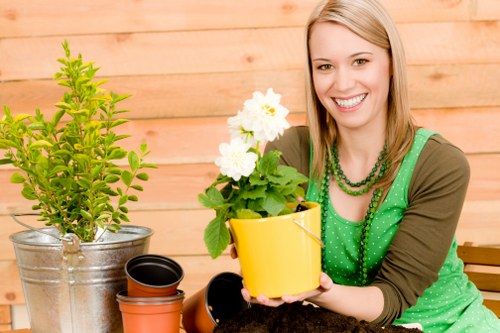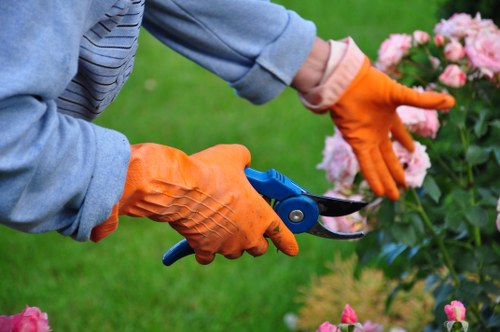Transforming Your Outdoor Space: Expert Landscaping Services in West Ham

West Ham, a vibrant area known for its rich culture and community spirit, is also home to some of the most beautifully landscaped gardens and outdoor spaces. Whether you're a homeowner looking to enhance your curb appeal or a business owner aiming to create an inviting environment for customers, landscaping in West Ham offers a myriad of possibilities.
Landscaping goes beyond just planting flowers and mowing the lawn. It involves careful planning, design, and maintenance to create a harmonious and functional outdoor space. In West Ham, the unique blend of urban living and green spaces provides the perfect backdrop for innovative landscaping solutions.
One of the key aspects of landscaping in West Ham is the use of native plants. These plants are well-suited to the local climate and soil conditions, ensuring they thrive with minimal maintenance. Additionally, native plants support local wildlife, contributing to the biodiversity of the area.

The Importance of Professional Landscaping
Professional landscaping services in West Ham bring expertise and creativity to your outdoor projects. Experienced landscapers understand the local climate, soil types, and plant varieties, ensuring that your garden remains beautiful and sustainable throughout the year.
Hiring a professional can save you time and effort. Landscaping involves various tasks, including soil preparation, planting, irrigation installation, and regular maintenance. Professionals have the tools and knowledge to handle these tasks efficiently, allowing you to enjoy your outdoor space without the hassle.
Moreover, professional landscapers can help you design a space that reflects your personal style and meets your specific needs. Whether you prefer a modern minimalist garden, a lush green retreat, or a vibrant floral display, experts can bring your vision to life.

Popular Landscaping Services in West Ham
There are several landscaping services available in West Ham, each catering to different aspects of outdoor design and maintenance. Some of the most popular services include:
- Garden Design and Planning: Creating a comprehensive plan that outlines the layout, plant selection, and features of your garden.
- Soft Landscaping: Focuses on the living elements of the garden, such as plants, trees, shrubs, and flowers.
- Hard Landscaping: Involves the non-living elements, including paths, patios, walls, and water features.
- Landscaping Maintenance: Regular upkeep to ensure that your garden remains healthy and aesthetically pleasing.
- Irrigation Systems: Installing efficient watering systems to keep your plants hydrated without wasting water.
Choosing the right combination of services can significantly enhance the beauty and functionality of your outdoor space.

Design Trends in West Ham Landscaping
Landscaping trends in West Ham are continually evolving, reflecting changing tastes and advancements in garden design. Some of the current trends include:
- Eco-Friendly Gardens: Emphasizing sustainable practices such as composting, rainwater harvesting, and the use of native plants.
- Outdoor Living Spaces: Creating areas for relaxation and entertainment, including patios, seating areas, and outdoor kitchens.
- Vertical Gardens: Utilizing vertical space to grow plants, which is especially beneficial in urban settings with limited ground space.
- Minimalist Design: Focusing on simplicity and clean lines, with a limited color palette and uncluttered spaces.
- Lighting Enhancements: Incorporating outdoor lighting to highlight garden features and create ambiance during the evening hours.
Staying updated with these trends can help you create a modern and attractive garden that stands out.

Choosing the Right Plants for West Ham
Selecting the appropriate plants is crucial for a successful landscape. In West Ham, it's essential to consider factors such as sunlight, soil type, and water availability when choosing plants.
Some popular plant choices in West Ham include:
- Lavender: Known for its fragrance and resilience, lavender thrives in sunny spots and well-drained soil.
- Boxwood: A versatile shrub that's ideal for creating hedges and topiaries.
- Hydrangeas: Beautiful flowering plants that add vibrant colors to gardens.
- Japanese Maple: Offers stunning foliage and adds a touch of elegance to any landscape.
- Hostas: Perfect for shaded areas, hostas provide lush greenery and textured leaves.
By choosing the right plants, you can ensure that your garden remains healthy and visually appealing throughout the year.
Hardscaping Elements That Enhance Your Garden
Hardscaping plays a vital role in defining the structure and functionality of your outdoor space. Key hardscaping elements include:
- Patios and Decks: Provide a space for outdoor gatherings and relaxation.
- Walkways and Paths: Guide visitors through your garden and add visual interest.
- Fencing and Walls: Offer privacy and create boundaries for different garden areas.
- Water Features: Add a soothing element with fountains, ponds, or waterfalls.
- Fire Pits: Create a focal point for evening entertainment.
Integrating these elements thoughtfully can transform your garden into a harmonious and functional space.
Maintenance Tips for West Ham Gardens
Maintaining a beautiful garden in West Ham requires regular care and attention. Here are some essential maintenance tips:
- Regular Pruning: Keeps plants healthy and promotes growth.
- Weeding: Prevents weeds from competing with your plants for nutrients.
- Irrigation Management: Ensures that plants receive adequate water without overwatering.
- Soil Health: Test and amend soil to provide optimal conditions for plant growth.
- Seasonal Cleanup: Remove fallen leaves and debris to keep the garden tidy.
Consistent maintenance helps preserve the beauty and functionality of your outdoor space.
Benefits of Landscaping in West Ham
Investing in landscaping offers numerous benefits, including:
- Enhanced Curb Appeal: A well-designed garden can significantly increase the attractiveness of your property.
- Increased Property Value: Quality landscaping can boost your home's market value.
- Environmental Benefits: Plants improve air quality, reduce noise pollution, and provide habitat for wildlife.
- Personal Enjoyment: A beautiful garden offers a peaceful retreat and a place to unwind.
- Energy Efficiency: Strategically placed trees and plants can provide shade and reduce energy costs.
These benefits make landscaping a worthwhile investment for both residential and commercial properties in West Ham.
Hiring a Landscaping Company in West Ham
When selecting a landscaping company in West Ham, consider the following factors:
- Experience: Look for companies with a proven track record in creating and maintaining gardens in the area.
- Portfolio: Review their previous projects to gauge their style and expertise.
- Services Offered: Ensure that the company provides the specific services you need.
- Customer Reviews: Check testimonials and reviews to assess customer satisfaction.
- Pricing: Compare quotes to find a company that offers quality services within your budget.
Choosing the right landscaping company ensures that your outdoor space is in capable hands.
Eco-Friendly Landscaping Practices
Adopting eco-friendly landscaping practices can make your garden more sustainable and environmentally friendly. Some green practices include:
- Rainwater Harvesting: Collecting and using rainwater for irrigation reduces reliance on municipal water supplies.
- Composting: Recycling garden waste into compost enriches the soil and reduces landfill waste.
- Native Plant Selection: Using native species minimizes water usage and supports local ecosystems.
- Solar Lighting: Utilizing solar-powered lights decreases energy consumption.
- Organic Fertilizers: Opting for natural fertilizers promotes healthy plant growth without chemical runoff.
Incorporating these practices contributes to a healthier environment and a more resilient garden.
Seasonal Landscaping Considerations
Different seasons bring unique challenges and opportunities for your garden. Here are some seasonal considerations for landscaping in West Ham:
- Spring: Focus on planting new flowers and trees, and prepare the soil for the growing season.
- Summer: Implement efficient irrigation systems to keep plants hydrated and manage pests effectively.
- Autumn: Perform leaf cleanup and plant bulbs for spring blooms.
- Winter: Protect sensitive plants from frost and plan next year's garden layout.
Understanding seasonal changes helps maintain a vibrant and healthy garden year-round.
Maximizing Small Outdoor Spaces
West Ham features a mix of residential and commercial properties, many with limited outdoor space. Maximizing small areas can be achieved through smart design choices:
- Vertical Gardening: Utilize walls and trellises to grow plants upwards, saving ground space.
- Multi-Functional Furniture: Choose furniture that offers storage or can be easily moved to accommodate different setups.
- Strategic Planting: Select compact plant varieties and arrange them to create the illusion of more space.
- Mirrors and Reflective Surfaces: These can make small areas appear larger by reflecting light and surrounding views.
- Minimalist Design: Keep the design simple and uncluttered to enhance the sense of spaciousness.
With these strategies, even the smallest outdoor areas can become beautiful and functional spaces.
Incorporating Art and Sculptures
Adding artistic elements to your garden can elevate its aesthetic appeal and create focal points. Consider the following ideas:
- Garden Sculptures: Choose pieces that complement your garden's theme and contribute to its overall design.
- Outdoor Art Installations: Incorporate murals, mosaics, or other artistic installations that reflect your personal style.
- Water Features: Artistic fountains or ponds can serve as both functional and visual enhancements.
- Decorative Planters: Use uniquely designed pots and planters to add color and texture to your garden.
- Lighting Art: Creative lighting can highlight sculptures and other garden features, adding drama and interest after dark.
Artistic touches make your garden unique and can create memorable experiences for visitors.
Integrating Technology in Landscaping
Modern technology offers innovative solutions to enhance and maintain your garden. Some tech integrations include:
- Smart Irrigation Systems: Automated watering systems that adjust based on weather conditions, saving water and ensuring optimal plant health.
- Landscape Lighting Controls: Use smart lighting systems that can be controlled via smartphones to create dynamic lighting effects.
- Garden Monitoring Sensors: Sensors that track soil moisture, temperature, and other environmental factors to inform maintenance decisions.
- Drones for Garden Planning: Utilize drones to survey and plan large or complex garden layouts efficiently.
- Automated Mowers and Tools: Keep your lawn tidy with robotic mowers and other automated gardening tools.
Incorporating technology can make garden management easier and more effective, allowing you to enjoy your outdoor space with minimal effort.
Creating Sustainable Gardens
Sustainability is a growing focus in landscaping, and creating a sustainable garden involves several key practices:
- Permeable Paving: Use materials that allow water to seep through, reducing runoff and promoting groundwater recharge.
- Native and Drought-Resistant Plants: These plants require less water and are more resilient to local pests and diseases.
- Composting: Turn organic waste into nutrient-rich compost to improve soil health naturally.
- Green Roofs and Walls: Incorporate vegetation into building structures to provide insulation and reduce urban heat.
- Pollinator-Friendly Plants: Plant flowers that attract bees, butterflies, and other pollinators to support local ecosystems.
Sustainable gardening not only benefits the environment but also creates a resilient and low-maintenance landscape.
Enhancing Privacy with Landscaping
Creating a private sanctuary in your garden is achievable through thoughtful landscaping. Here are some strategies:
- Hedgerows and Fences: Use dense shrubs or well-designed fences to block unwanted views.
- Strategic Planting: Position tall plants or trees around the perimeter to create natural barriers.
- Privacy Screens: Install screens made of wood, metal, or other materials to provide immediate privacy.
- Pergolas and Trellises: These structures can support climbing plants that add both beauty and seclusion.
- Water Features: Incorporate ponds or fountains that mask noise and provide a sense of seclusion.
With these techniques, you can enjoy your garden in peace, free from the distractions of the outside world.
Budget-Friendly Landscaping Ideas
Creating a beautiful garden doesn't have to break the bank. Consider these budget-friendly ideas:
- DIY Projects: Take on simple projects like building raised beds, installing paths, or creating compost bins.
- Upcycle Materials: Use reclaimed wood, old containers, and other recycled materials for garden structures and decorations.
- Native Plants: These often require less care and resources, reducing long-term maintenance costs.
- Mulching: Apply mulch to retain moisture, suppress weeds, and improve soil quality without expensive fertilizers.
- Buy in Bulk: Purchase plants and materials in bulk to take advantage of discounts.
Implementing these cost-effective strategies allows you to achieve a stunning garden without overspending.
Seasonal Color Schemes
Incorporating seasonal color schemes can keep your garden vibrant and interesting throughout the year. Here's how to approach it:
- Spring: Plant tulips, daffodils, and cherry blossoms to welcome the season with bright colors.
- Summer: Use sunflowers, petunias, and marigolds to create a lively and colorful atmosphere.
- Autumn: Incorporate chrysanthemums, asters, and ornamental grasses for warm hues.
- Winter: Choose evergreens, holly, and winter-blooming plants to add color during the colder months.
- Year-Round: Mix perennials and annuals to ensure continuous color and interest.
By planning color schemes around the seasons, your garden can remain captivating all year long.
Creating Functional Zones
Dividing your garden into functional zones can enhance its usability and organization. Consider these zones:
- Entertainment Area: A space with seating, dining, and possibly a barbecue setup for hosting guests.
- Vegetable Garden: An area dedicated to growing fruits, vegetables, and herbs.
- Relaxation Spot: A quiet nook with comfortable seating, perhaps under a pergola or beside a water feature.
- Play Area: A safe and enjoyable space for children to play.
- Pathways: Clearly defined paths that guide visitors through different parts of the garden.
Establishing distinct zones makes your garden more organized and caters to various activities and preferences.
Lighting Your Landscape
Proper lighting can transform your garden, making it usable and beautiful even after dark. Consider the following lighting options:
- Pathway Lights: Illuminate walkways to ensure safety and add visual interest.
- Spotlights: Highlight garden features like trees, sculptures, or water elements.
- String Lights: Create a cozy and inviting atmosphere in seating areas or above patios.
- Solar Lights: Eco-friendly options that harness solar energy for illumination.
- Accent Lighting: Use colored or themed lights to add character and uniqueness to your garden.
Strategically placed lighting enhances the beauty and functionality of your landscape while extending your outdoor enjoyment into the evening hours.
Choosing the Right Mulch
Mulch is an essential component of gardening, offering numerous benefits:
- Moisture Retention: Helps keep the soil hydrated by reducing evaporation.
- Weed Suppression: Blocks sunlight, preventing weed growth and reducing maintenance.
- Soil Temperature Regulation: Keeps the soil cooler in summer and warmer in winter.
- Soil Improvement: Organic mulches break down over time, adding nutrients to the soil.
- Aesthetic Appeal: Enhances the overall look of your garden with varied textures and colors.
Choosing the right type of mulch—whether organic, inorganic, or decorative—depends on your garden's specific needs and aesthetic preferences.
Water Conservation in Landscaping
Water conservation is a critical consideration in modern landscaping. Here are some strategies to reduce water usage:
- Drought-Tolerant Plants: Select plants that require less water and are adapted to dry conditions.
- Drip Irrigation: Delivers water directly to the plant roots, minimizing waste.
- Rain Gardens: Capture and utilize rainwater, reducing runoff and providing natural irrigation.
- Mulching: As mentioned earlier, mulch reduces water evaporation from the soil.
- Greywater Systems: Reuse household water from sinks, showers, and laundry for garden irrigation.
Implementing water-saving techniques ensures a sustainable and efficient garden that conserves this valuable resource.
Edible Landscaping in West Ham
Edible landscaping combines aesthetics with functionality, allowing you to grow food while enhancing your garden's beauty. Ideas for edible landscaping include:
- Fruit Trees: Apple, pear, and cherry trees provide both shade and delicious fruits.
- Herb Gardens: Plant herbs like basil, rosemary, and thyme for culinary use and fragrance.
- Vegetable Beds: Create dedicated areas for growing vegetables such as tomatoes, peppers, and lettuce.
- Berry Bushes: Strawberries, blueberries, and raspberries add color and sweetness to the garden.
- Vining Plants: Grapes and melons can be trained to climb trellises, maximizing space and yield.
Edible landscaping not only provides fresh produce but also promotes a deeper connection with your garden and the food you consume.
Using Sustainable Materials
Choosing sustainable materials for your garden structures and features supports environmental responsibility and long-term durability. Consider the following materials:
- Recycled Wood: Utilize reclaimed lumber for decking, fencing, and garden beds.
- Bamboo: A renewable resource that's strong and versatile for various garden uses.
- Natural Stone: Durable and timeless, stone is ideal for pathways, walls, and water features.
- Composite Materials: Made from recycled plastics and wood fibers, composites are low-maintenance and eco-friendly.
- Metal: Recycled metals can be used for decorative elements and functional structures.
Incorporating sustainable materials ensures that your garden is both beautiful and environmentally conscious.
Creating a Wildlife-Friendly Garden
Supporting local wildlife enriches your garden ecosystem and contributes to biodiversity. Here are ways to make your garden wildlife-friendly:
- Provide Habitat: Install birdhouses, bat boxes, and insect hotels to offer shelter and nesting sites.
- Plant Diversity: Use a variety of plants to attract different species of birds, bees, butterflies, and other wildlife.
- Water Sources: Add birdbaths, ponds, or shallow dishes to provide drinking and bathing water.
- Avoid Pesticides: Use natural pest control methods to protect beneficial insects and animals.
- Native Plant Selection: As mentioned earlier, native plants support local wildlife more effectively.
A wildlife-friendly garden fosters a balanced and thriving ecosystem, enhancing the natural beauty of your outdoor space.
Incorporating Color and Texture
Adding diverse colors and textures to your garden creates visual interest and depth. Consider the following tips:
- Varied Planting: Mix different plant species with varying leaf shapes, sizes, and colors.
- Seasonal Blooms: Plant flowers that bloom at different times to ensure continuous color throughout the year.
- Contrasting Textures: Combine smooth leaves with rough, spiky, or fuzzy foliage for tactile variety.
- Color Coordination: Choose color schemes that complement each other and enhance the overall harmony of the garden.
- Accent Plants: Use bold or unique plants as focal points to draw attention and add character.
By thoughtfully incorporating color and texture, your garden becomes a dynamic and engaging space that delights the senses.
Benefits of Green Roofs
Green roofs are an innovative landscaping solution that offers numerous advantages:
- Insulation: Green roofs provide natural insulation, reducing heating and cooling costs.
- Stormwater Management: They absorb rainwater, minimizing runoff and reducing the risk of flooding.
- Air Quality Improvement: Plants on green roofs filter pollutants and produce oxygen.
- Urban Heat Island Reduction: Green roofs help cool cities by offsetting the heat generated by buildings and pavement.
- Aesthetic Enhancement: They add beauty and greenery to rooftops, creating pleasant outdoor spaces.
Implementing green roofs contributes to sustainable urban living and enhances the environmental quality of West Ham.
Utilizing Vertical Space
Maximizing vertical space in your garden can enhance its appearance and increase plant capacity. Here are some ways to utilize vertical space:
- Wall Planters: Attach planters to walls to grow herbs, flowers, or small vegetables.
- Trellises and Arbors: Support climbing plants like vines, roses, and cucumbers.
- Hanging Baskets: Suspend baskets from structures to add layers and depth to your garden.
- Living Walls: Install vertical gardens with a variety of plants to create a lush, green statement.
- Shelving Units: Use sturdy shelves to display potted plants and decorative items.
By creatively using vertical space, you can enhance your garden's productivity and visual appeal without expanding its footprint.
Integrating Water Elements
Water elements add tranquility and movement to your garden. Consider incorporating:
- Ponds: Create a natural water feature that supports aquatic plants and wildlife.
- Fountains: Add a soothing sound of running water to enhance the garden's ambiance.
- Waterfalls: Design cascading water features for a dramatic and relaxing effect.
- Stream Beds: Build artificial streams to guide water through your garden.
- Birdbaths: Provide a simple water source that attracts birds and other small creatures.
Water elements not only beautify your garden but also create a serene environment that promotes relaxation and well-being.
Conclusion: Elevate Your Garden with West Ham Landscaping Experts
Landscaping in West Ham offers endless opportunities to create a beautiful, functional, and sustainable outdoor space. From choosing the right plants and materials to incorporating innovative design elements, professional landscaping services can help you achieve your garden goals.
Whether you're looking to enhance your home’s curb appeal, create a private sanctuary, or develop a vibrant public space, the expertise available in West Ham ensures that your vision becomes a reality. Embrace the art and science of landscaping to transform your outdoor environment into a place of beauty and harmony.
Contact us today to start your landscaping journey and book your service now to enjoy a stunning garden that reflects your style and meets your needs.